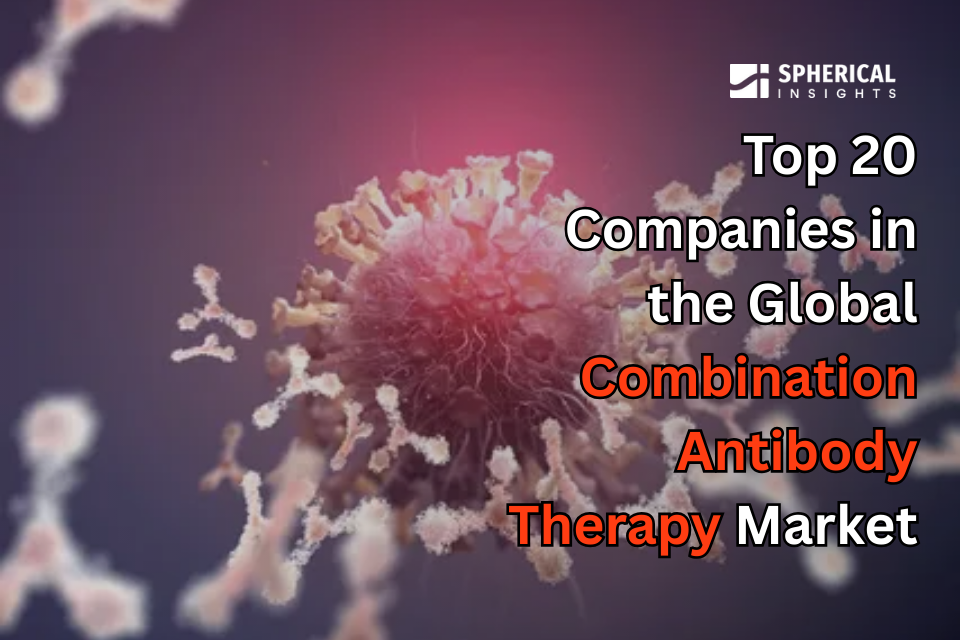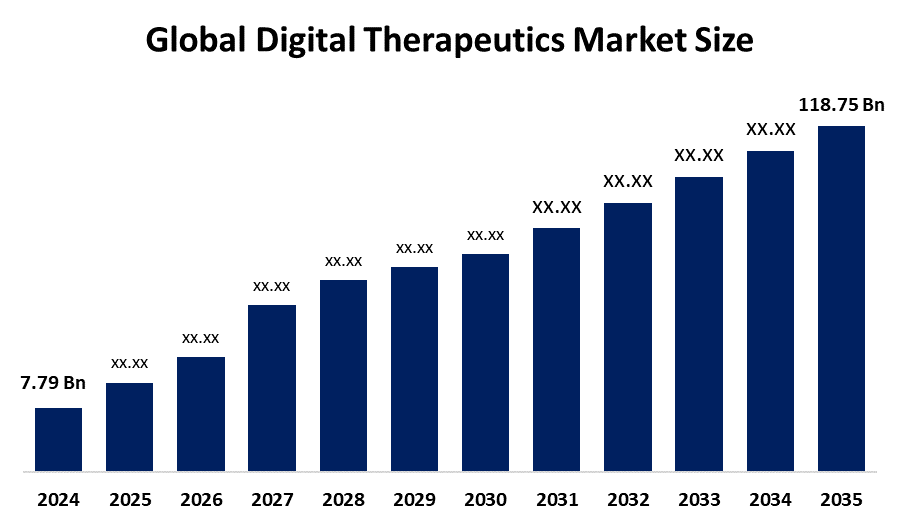
Top 20 Companies in the Global Combination Antibody Therapy Market
RELEASE DATE: Aug 2025 Author: Spherical InsightsRequest Free Sample Speak to Analyst
Description
According to a research report published by Spherical Insights & Consulting, The Global Combination Antibody Therapy Market Size is projected to Grow from USD 230.5 Billion in 2024 to USD 591.5 Billion by 2035, at a CAGR of 8.95% during the forecast period 2025–2035. The market for combination antibody therapy is being driven by various factors, including the rising prevalence of cancer, advancements in immunotherapy, and the growing need for more effective treatment options for resistant or aggressive cancers.
Introduction
The global combination antibody therapy market includes the discovery, production, and marketing of medicines that use two or more monoclonal antibodies in a single therapy regimen to target illnesses, most notably cancer. Combination antibody therapy is a specialized method that improves therapeutic efficacy by concurrently targeting various signaling pathways involved in tumor development while also boosting the immune system to detect and kill cancer cells. This technique tackles the drawbacks of single-agent therapy, including drug resistance and tumor heterogeneity, which frequently diminish therapeutic success. Significant advances in immunology, molecular oncology, and biotechnology are propelling the industry forward, allowing for the development of more precise and effective combination medicines. The rising global cancer rate has increased demand for such medicines, while individualized therapy techniques tailored to individual tumor characteristics are driving market growth. The discovery of multifunctional immune-stimulating medicines in combination with monoclonal antibodies improves treatment results. Furthermore, patent expirations, the introduction of new goods, and increased research activity all present profitable potential for market expansion. Overall, combined antibody therapy offers a game-changing strategy in cancer, providing more comprehensive, focused, and efficient treatment choices, paving the way for continuing worldwide expansion in response to growing healthcare requirements and technological improvements.
Navigate Future Markets with Confidence: Insights from Spherical Insights LLP
The insights presented in this blog are derived from comprehensive market research conducted by Spherical Insights LLP, a trusted advisory partner to leading global enterprises. Backed by in-depth data analysis, expert forecasting, and industry-specific intelligence, our reports empower decision-makers to identify strategic growth opportunities in fast-evolving sectors. Clients seeking detailed market segmentation, competitive landscapes, regional outlooks, and future investment trends will find immense value in the full report. By leveraging our research, businesses can make informed decisions, gain a competitive edge, and stay ahead in the transition toward sustainable and profitable solutions.
Unlock exclusive market insights - Download the Brochure now and dive deeper into the future of the Combination Antibody Therapy Market.
Combination Antibody Therapy Market Size & Statistics
- The Market Size for Combination Antibody Therapy Was Estimated to be worth USD 230.5 Billion in 2024.
- The Market Size is Going to Expand at a CAGR of 8.95% between 2025 and 2035.
- The Global Combination Antibody Therapy Market Size is anticipated to reach USD 591.5 Billion by 2035.
- North America is expected to generate the highest demand during the forecast period in the Combination Antibody Therapy Market
- Europe is expected to grow the fastest during the forecast period in the Combination Antibody Therapy Market.

Regional growth and demand
Europe is expected to grow the fastest during the forecast period in the Combination Antibody Therapy market. Europe is becoming a key hub for antibody therapeutics, driven by EMA’s adaptive pathways, multi-national trials, and funding for real-world evidence programs. Countries like Germany, Switzerland, and the UK lead biologics innovation, supported by strengthened manufacturing capabilities.
North America is expected to generate the highest demand during the forecast period in the combination antibody therapy market. North America leads the global antibody therapy market due to its strong biologics R&D ecosystem, access to funding, supportive healthcare frameworks, and proximity to top academic research centers and specialized CROs, with the USA dominating regulatory approvals and innovation.
Top 10 Trends in the Combination Antibody Therapy Market
- Strong Market Growth
- Focus on Oncology and Autoimmune Diseases
- Product Innovation in Antibody Formats
- Advancements in Antibody Engineering
- High Clinical Demand
- Significant Investment and M&A Activity
- Emergence of Novel Combinations
- Growth in Specific Cancer Therapies
- Increasing Role in Infectious Diseases
- Key Player Dominance and Collaboration
1. Strong Market Growth
The combined antibody therapy market is expanding rapidly in response to rising demand for more effective treatments for a wide range of disorders. Rising cancer rates, along with advances in biologics and immunotherapies, are propelling global acceptance of combination therapy.
2. Focus on Oncology and Autoimmune Diseases
The majority of combination antibody therapeutics are being researched for cancer and autoimmune diseases, where traditional treatments frequently have inadequate success. Targeting these high-need regions improves patient outcomes and increases business potential.
3. Product Innovation in Antibody Formats
Companies are experimenting with various antibody forms, such as bispecific, antibody-drug conjugates, and multi-targeted antibodies. These advances improve specificity, minimize adverse effects, and increase overall treatment efficacy.
4. Advancements in Antibody Engineering
Advances in molecular biology and immunology enable the development of antibodies with stronger affinity, greater stability, and increased immunological activation. These technological advances are making medicines more effective and individualized.
5. High Clinical Demand
Growing awareness among physicians and patients, along with positive clinical outcomes, is driving up demand for combination antibody therapy. High unmet medical requirements in complicated disorders are further boosting the worldwide clinical demand.
Empower your strategic planning:
Stay informed with the latest industry insights and market trends to identify new opportunities and drive growth in the combination antibody therapy market. To explore more in-depth trends, insights, and forecasts, please refer to our detailed report.
Top 25 Companies Leading the Combination Antibody Therapy Market
- F. Hoffmann-La Roche Ltd.
- Mylan N.V.
- Sanofi
- Pfizer Inc.
- GSK plc
- Novartis AG
- Bayer AG
- Lilly
- Merck & Co., Inc.
- Sun Pharmaceutical Industries Ltd.
- Teva Pharmaceutical Industries Ltd
- Seagen Inc.
- CELGENE CORPORATION
- Genmab A/S
- Regeneron Pharmaceuticals
- AstraZeneca
- Genmab
- Aurobindo Pharma
- Biogen
- Roche Holdings
- Seattle Genetics
- Bristol Myers Squibb
- Amgen
- AbbVie Inc.
- Takeda Pharmaceutical Company Limited
1. F. Hoffmann-La Roche Ltd. (Roche)
Headquarters: Basel, Switzerland
Roche, based in Basel, Switzerland, operates in more than 100 countries and is a global leader in cancer and immunology. With a diverse array of monoclonal and bispecific antibodies, the business has made a significant impact in the biologics industry. Roche continues to spend extensively in combination antibody therapy research and development, with a focus on medicines that target several tumor pathways while improving immune system responses. Roche's strategic emphasis on innovation, along with a strong clinical trial pipeline, puts it as a leader in providing advanced cancer medicines that address drug resistance and enhance patient outcomes.
2. Mylan N.V.
Headquarters: Canonsburg, Pennsylvania, USA
Mylan, currently part of Viatris and located in Canonsburg, Pennsylvania, operates in over 165 countries throughout the world. The company's robust portfolio of biosimilars contributes significantly to increasing worldwide access to antibody treatments. By creating and distributing low-cost monoclonal antibody alternatives, Mylan helps to make innovative medicines more accessible in both developed and emerging economies. In the context of combination antibody treatment, its efforts ensure that patients in cost-sensitive areas have access to cutting-edge biologics. This strategy approach positions Mylan as a significant facilitator of market-wide adoption and affordability.
3. SANOFI
Headquarters: Paris, France
Sanofi, headquartered in Paris, France, operates in over 100 countries and is a key participant in the advancement of antibody-based medicines. The company's research and development efforts are centered on cancer and autoimmune illnesses, where it has developed a robust pipeline of novel biologics. Sanofi is currently developing bispecific antibodies and next-generation treatments that address several disease pathways. In the realm of combined antibody therapy, the business focuses on ways that increase treatment efficacy and patient outcomes. Sanofi's global footprint and excellent R&D capabilities position it as a key contributor to the advancement of antibody-based medicines globally.
4. Pfizer Inc.
Headquarters: New York, USA
Pfizer, based in New York, USA, operates in over 125 countries and has a dominant position in the worldwide biologics industry. The business is developing antibody-drug conjugates and bispecific antibodies, with an emphasis on cancer and immunotherapy. Pfizer's goal with combination techniques is to improve therapeutic efficacy while addressing the limitations of single-agent therapies. Its robust clinical trial pipeline, coupled with a well-established global commercialization network, enables the rapid development and distribution of innovative therapies. Pfizer's efforts continue to play a key role in advancing the global expansion and adoption of combination antibody treatments.
5. GSK plc
Headquarters: London, United Kingdom
GSK, based in London, UK, operates in over 100 countries and is a major competitor in the antibody therapies business. The firm is focused on immune-oncology and the creation of next-generation antibody forms, such as bispecific antibodies. With a strong commitment to innovation, GSK emphasizes combination therapies that integrate checkpoint inhibitors and targeted agents to enhance treatment outcomes. These techniques are intended to combat complicated tumors more effectively by targeting many pathways at once. GSK's global presence and R&D experience enable it to advance combination antibody treatments and provide more treatment options for patients globally.
Are you ready to discover more about the combination antibody therapy market?
The report provides an in-depth analysis of the leading companies operating in the global combination antibody therapy Market. It includes a comparative assessment based on their product portfolios, business overviews, geographical footprint, strategic initiatives, market segment share, and SWOT analysis. Each company is profiled using a standardized format that includes:
Company Profiles
- F. Hoffmann-La Roche Ltd. (Roche)
- Business Overview
- Company Snapshot
- Products Overview
- Company Market Share Analysis
- Company Coverage Portfolio
- Financial Analysis
- Recent Developments
- Merger and Acquisitions
- SWOT Analysis
- Mylan N.V.
- SANOFI
- Pfizer Inc.
- GSK plc
- Novartis AG
- Bayer AG
- Lilly
- Merck & Co., Inc.
- Others.
Conclusion
The Global Combination Antibody Therapy Market is expected to develop rapidly, driven by increased cancer frequency, advances in immunology, and the need for more effective therapies against tumor complexity and drug resistance. Combination medicines, such as bispecific antibodies and antibody-drug conjugates, improve effectiveness by targeting various routes and increasing immune responses. Increasing R&D spending, supporting regulatory frameworks, and expanding clinical trials are driving innovation and acceptance. Major pharmaceutical corporations, aided by biosimilar makers, are reshaping the competitive environment. With customized medicine and technical advancements, combined antibody treatments are poised to become a cornerstone of cancer and autoimmune disease care throughout the world.
About the Spherical Insights & Consulting
Spherical Insights & Consulting is a market research and consulting firm which provides actionable market research study, quantitative forecasting and trends analysis provides forward-looking insight especially designed for decision makers and aids ROI.
Which is catering to different industry such as financial sectors, industrial sectors, government organizations, universities, non-profits and corporations. The company's mission is to work with businesses to achieve business objectives and maintain strategic improvements.
CONTACT US:
For More Information on Your Target Market, Please Contact Us Below:
Phone: +1 303 800 4326 (the U.S.)
Phone: +91 90289 24100 (APAC)
Email: inquiry@sphericalinsights.com, sales@sphericalinsights.com
Contact Us: https://www.sphericalinsights.com/contact-us
Need help to buy this report?